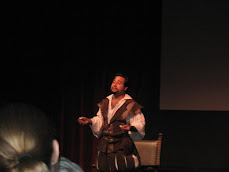'Morrie' brings a poignant lesson
Published: June 12, 2009
American Stage Theatre Company's production of "Tuesdays with Morrie" is tender, warm and sentimental. The play reflects all the qualities the company has imparted to audiences for the past 30 years. As the first show in the Raymond James Theatre, American Stage's new home, it's the perfect segue for many years more of the same.
In 1997, Mitch Albom published his best-selling memoir "Tuesdays with Morrie," which Jeffrey Hatcher adapted for the stage in 2001.
The story begins with Albom attending Brandeis University in the 1970s. He majored in sociology, in part because of the close friendship he developed with his professor, Morrie Schwartz. Albom promised Morrie he would stay in touch after graduation. He didn't.
He worked as a jazz pianist in New York before entrenching himself in the world of journalism. Albom became a columnist for the Detroit Free Press, a nationally syndicated radio host for ABC and a panelist on ESPN's "The Sports Reporters." He was a busy guy, and then one day he saw his old professor on ABC's "Nightline" with Ted Koppel.
Morrie was dying. He had ALS (more commonly known as Lou Gehrig's disease), and he wanted to teach the world what death was all about. Albom decided to visit Morrie for what he thought would be a final goodbye. It wasn't.
Every Tuesday thereafter, in continuance with Tuesdays' classes Albom took at Brandeis, he visited Morrie in his Massachusetts home. Albom asked questions and Morrie answered them, imparting a legacy of wisdom, love and affection into a tape recorder.
Morrie died in 1995. Two years later, Albom shared his story, which stayed on the New York Times Best Seller List four years in a row.
For the American Stage production, directed by T. Scott Wooten, actors Chaz Mena and Michael Edwards played Mitch and Morrie, respectively. Both were exceptional.
As the young Mitch, Mena was enthusiastic and boyish, full of the promise that Morrie first saw in his student. Mena brought a freneticism to the superstar reporter phase, and later tempered that to accommodate Morrie's slower pace. In the end, Mena emoted a change of heart - an expansion of his ability to embrace life fully, pain and joy included, just as Morrie had done.
Charming, facetious and droll, Edwards' performance was spellbinding. He was so good his character's death was nearly as heartbreaking as losing a loved one in real life. So be prepared to laugh and cry. As Morrie says, "I'm on the last great journey here; and people want me to tell them what to pack."




















